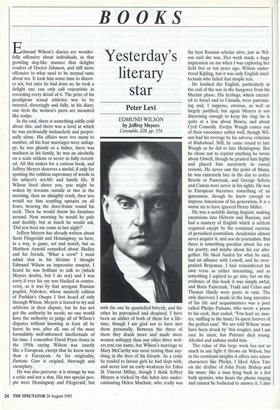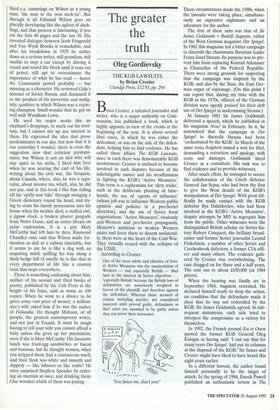BOOKS
Yesterday's literary star
Peter Levi
EDMUND WILSON by Jeffrey Meyers Constable, £20, pp. 554 Edmund Wilson's diaries are wonder- fully offensive about individuals, in that growling dog-like manner that delights readers of Doctor Johnson, and still more offensive to what used to be normal taste about sex. It took him some time to discov- er sex, but once he had done so, he took a delight one can only call voyeuristic in recording every detail of it. The prize of his prodigious sexual athletics was to be entered, slaveringly and fully, in his diary; one feels the women's parts are mounted like scalps.
In the end, there is something oddly cold about this, and there was a level at which he was profoundly melancholy and perpet- ually alone. His affairs were too many to number, all his four marriages were unhap- py, he was ghastly as a father, there was madness in his family, he was an alcoholic on a scale seldom or never so fully record- ed. All this makes for a curious book, and Jeffrey Meyers deserves a medal, if only for spotting the ruthless supremacy of words in his subject's sex-life and family life. If Wilson lived above you, you might be woken by screams outside at two in the morning, then an almighty crash, then you would see him scuttling upstairs on all fours, wearing the door-frame round his neck. Then he would throw his furniture around. Next morning he would be pale and deathly, but at lunch he would ask, 'Did you hear me come in last night?'
Jeffrey Meyers has already written about Scott Fitzgerald and Hemingway, so here, in a way, is game, set and match, but as Matthew Arnold remarked about Shelley and his friends, 'What a crew!' I must admit that in his lifetime I thought Edmund Wilson an impressive essayist, I heard he was brilliant to talk to (which Meyers doubts, but I do not) and I was sorry if ever his eye was blacked in contro- versy, as it was by that arrogant Russian pugilist, Nabokov, whose masterly edition of Pushkin's Onegin I first heard of only through Wilson. Meyers is forced to try and arbitrate in their dispute, but he has not got the authority he needs; no one would have the authority to judge all of Wilson's disputes without knowing at least all he knew; he was, after all, one of the most formidably well-informed intellectuals of his time. I remember David Pryce-Jones in the 1950s saying Wilson was exactly like a European, except that he knew more than a European. As for originality, Patriotic Gore is original, thorough and exemplary.
He was also perverse: it is strange he was a critic and not a don. His two special peo- ple were Hemingway and Fitzgerald, but with the one he quarrelled bitterly, and the other he patronised and despised. I have been an addict of both of them for a life- time, though I am glad not to have met them personally. Between the three of them they drank more and made more women unhappy than any other three writ- ers you can name, but Wilson's marriage to Mary McCarthy was more testing than any- thing in the lives of his friends. As a critic he tended to favour girls he had slept with, and never lost an early weakness for Edna St Vincent Millay, though I think Jeffrey Meyers is tricked by this habit into under- estimating Helen Muchnic, who really was the best Russian scholar alive, just as Wil- son said she was. Her work made a huge impression on me when I was exploring her field five or ten years ago. Wilson under- stood Kipling, but it was only English intel- lectuals who failed that simple test.
He loathed the English, particularly at the end of the war in the hangover from his Marxist phase. His feelings, which extend- ed to Israel and to Canada, were patronis- ing and, I suppose, envious, as well as largely justified, but again Meyers is not discerning enough to keep the ring: he is quite at a loss about Bowra, and about Cyril Connolly. Evelyn Waugh comes out of their encounter rather well, though Wil- son had his revenge by his adverse criticism of Brideshead. Still, he came round to late Waugh as he did to late Hemingway. But he chose not to reprint anything he wrote about Orwell, though he praised him highly and placed him accurately in casual reviews. He never saw the point of Mann, he was extremely late in the day to notice Brecht or Pasternak, and George Seferis and Camus were never in his sights. He was in European literature something of an ignoramus, though he knew enough to impress Americans of his generation. It is a worse sin to have ignored Henry Miller.
He was a notably daring linguist, making excursions into Hebrew and Russian, and had a mastery of English which is seldom acquired except by the continual exercise of periodical journalism. Academics almost never acquire it, and nor do journalists. But there is something peculiar about his ear for poetry, and maybe about his ear alto- gether. He liked Auden for what he said, had an alliance with Lowell, and he over- praised Betjeman. I had remembered his own verse as rather interesting, and as something I aspired to go into, but on the evidence of this book it was simply awful, and Boris Pasternak, Trakl and Celan and Thomas Hardy were poets in vain. The only discovery I made in the long narrative of his life and acquaintances was a poet called Phelps Putnam, who wrote a poem to his cock, that ended, 'You lead us, mas- ter, sniffing to the hunt,/ In quest forever of the perfect cunt'. We are told Wilson 'must have been struck by' this couplet, and I am sure he must, but Putnam died young. Alcohol and asthma undid him.
The value of this large work lies not so much in any light it throws on Wilson, but in the continual insights it offers into minor characters like Phelps. I liked Allen Tate on the decline of John Peale Bishop and his muse: like a man lying back in a hot bath upstairs, who hears the phone ringing and cannot be bothered to answer it. I also liked e.e. cummings on Wilson as a young man, 'the man in the iron neck-tie'. But through it all Edmund Wilson goes on placidly developing like the ugliest of duck- lings, and that process is fascinating, if you cut the first 40 pages and the last 20. His invented dialogue between Scott Fitzgerald and Van Wyck Brooks is remarkable, and after his breakdown in 1929 he settles down as a serious writer, still penniless, still unable to stop a car except by driving it round and round the block until it runs out of petrol, still apt to overestimate the importance of what he has read — hence the Communist period probably — but amazing as a character. He reviewed Gide's account of Soviet Russia, and dismissed it as the product of his perversity and malig- nity, qualities in which Wilson was a rejoic- ing champion. Small wonder that he got on well with Wyndham Lewis.
He used his major works like an elephant's droppings, to mark out his terri- tory, but I cannot stir up any interest in them. He expressed the idea that prose predominates in our day, but now that it is our yesterday I wonder; there is even the suggestion now that criticism predomi- nates, but Wilson is not an idol who will stay quiet in his niche. I liked him best when he was nearing the end of his life, writing about the civil war, the Iroquois, about Canada, where, alas, he was a sepa- ratist, about income tax, which, alas, he did not pay, and in this book I like him falling off his 'spiffy new bike' through swinging a Greek dictionary round his head, and try- ing to cram his family possessions into his house when his mother died, a stuffed owl, a jigsaw clock, a broken plaster gargoyle from Notre Dame, and an entire library on polar exploration. It .is a pity Mary McCarthy had left him by then. Raymond Chandler once said that Wilson made for- nication as dull as a railway timetable, but it seems to me he is like a dog with an enquiring mind, sniffing his way along a thick hedge full of smells: he is like that in every department of life like a country train that stops everywhere.
There is something endearing about him: neither of his second and third books of poetry, published by the Colt Press at the height of his fame, sold as many as 100 copies. When he went to a dinner to be given some vast prize of money, a million- aire's wife asked him if he was the author of Finlandia. He thought Malraux, of all people, the greatest contemporary writer, and not just in French. It must be tough having to tell your wife you cannot afford a baby unless she gives up her psychiatrist, even if she is Mary McCarthy. His favourite lunch was fried-egg sandwiches or bacon and bananas, but he thought women, when you stripped them, had a crustaceous smell, and their flesh was white and smooth and slippery — like lobsters or like crabs? He once surprised Stephen Spender by order- ing six martinis at once, and drinking them. One wonders which of them was paying.



















































 Previous page
Previous page